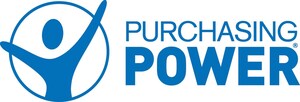ATLANTA, March 1, 2017 /PRNewswire/ -- Purchasing Power®, the leading employee purchase program offering consumer products and services as a voluntary benefit at the workplace, is powering people through some of life's unavoidable financial emergencies. With nearly six in 10 Americans lacking the savings to cover a $500 or $1,000 unplanned expense,1 it's important to be credit-educated and to understand hidden costs and fees associated with high-risk credit options.
"Household appliances break down and car tires suddenly need replacing – these are facts of life that can take an already fragile financial situation and make it much worse," says Richard Carrano, CEO of Purchasing Power. "A line of credit or a payday loan may look like a lifeline at the time, but steep interest charges, particularly for those who have a low credit score to begin with, can quickly push us off the financial cliff. Knowing more about all of the financing options out there can help people make the best decision for their situation."
Cash is always king, of course, and is the best option for avoiding fees and missed payments. However, understanding the options when cash is not available can help ensure making the best choice to meet short-term needs without compromising long-term finances.
Credit cards: Even with a shaky financial history, consumers can typically find a creditor willing to offer a line of credit, but it will likely come with a steep annual percentage rate that accrues each month. Furthermore, if you're only making the monthly minimum payments and/or you miss a payment due date, you could end up carrying that debt for years before it's fully paid down.
Employee purchase programs: Research shows that financial stress at home regularly impacts employee productivity at work. This leads many employers to offer an employee purchase program such as Purchasing Power, which provides products and services through automatic paycheck deductions over a 12-month period. There's no credit check, zero interest and no hidden fees. There's also a free financial wellness platform to help with budgeting, credit reports and personal coaching.
Rent to own: With rent-to-own products, there's a monthly principal amount plus service fees and taxes for a period of time, up to completing the rental agreement and owning the item outright. While the monthly rate makes items like appliances, electronics and furniture immediately accessible, be wary of the long-term cost. Renters can end up paying as much as three times the retail value of an item before satisfying the terms for ownership.
Payday/Title loans: Essentially, these loans function as a loan against a future paycheck or your vehicle. They often come with high percentage rates and fees, as well as extremely short repayment schedules. Rely on these loans only if you are certain you can cover the entire loan and associated fees by the designated due date.
Banking Overdrafts: If your recent purchase or payment drops your checking/savings account balance below zero, it may still go through – but at a steep price, which can range between $15-$35 per transaction, depending on your bank. Through "convenient" overdraft programs, many banks cover checks, online and debit card transactions, but also charge individual overdraft fees in return. The problem escalates quickly if overdraft transactions continue after your account dips below zero – the bank can charge multiple, expensive overdraft fees in one day.
"Without a doubt, consumers should be aware of terms of their financing options before jumping head-first into a purchase. For the most part, rent-to-own, payday loans and installment loans are extremely costly options," Carrano explains.
"Employee purchase programs are a better option. For example, Purchasing Power's employee purchase program offers all-inclusive pricing that includes the actual product, value-added features such as extended warranties and accessories, shipping and handling fees, as well as any applicable taxes. Employees know the total cost upfront," he says. "Further, a 12-month payroll deduction schedule helps ensure that the payment amount never changes and they won't miss a payment. So they don't face the consequences of missed payments, compounding interest rates and fees, or loss of merchandise like they would with rent-to-own, payday loans or installment loans. Employee purchase programs provide a cost-effective, financially responsible way to purchase," Carrano concludes.
About Purchasing Power, LLC
Purchasing Power, LLC, is one of the fastest-growing voluntary benefit companies in the industry, offering a leading employee purchase program for consumer products and services as well as providing financial tools and resources to improve employee financial wellness. Purchasing Power is available to millions of people through large companies including Fortune 500s, associations and government agencies. Headquartered in Atlanta, Purchasing Power is 'Powering People to a Better Life™' through its employee purchase program, financial literacy efforts and corporate social responsibility initiatives. Purchasing Power is a Flexpoint Ford, LLC company. For more information, visit www.PurchasingPower.com.
1Bankrate survey conducted by Princeton Survey Research Associates International, January 2017
Media Contact:
Joe Swaney, 404.609.5630
[email protected]
Juliann Kaiser, 770.643.0615
[email protected]
SOURCE Purchasing Power, LLC
Related Links
WANT YOUR COMPANY'S NEWS FEATURED ON PRNEWSWIRE.COM?
Newsrooms &
Influencers
Digital Media
Outlets
Journalists
Opted In





Share this article